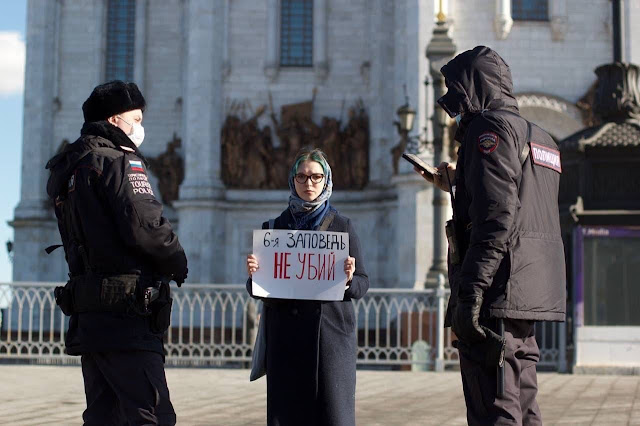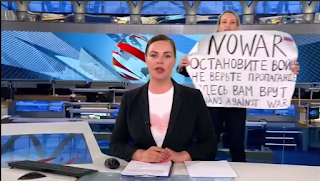If you've been following my blog for a while, you may have noticed that the language, culture, history, religious life, and politics of Russia have been a huge part of my life for more than fifty years.
Vladimir Putin's attack on Ukraine, waged with Russian resources that are badly needed elsewhere, and with some hard-to-estimate level of approval from a mostly passive population, is a really hard blow for me. (I imagine you might be saying, correctly, not as hard as it is for Ukrainians!!) I cling for comfort to one of opposition politician Aleksei Navalny's 2018 campaign slogans, "The Beautiful Russia of the Future."
Why bring up Navalny now, when world-shaking events are unfolding, when armies are moving, when world leaders are weighing risks and taking sides? Here's why: today Navalny is again on trial, facing the possibility of yet another prison sentence, and the mechanisms that make this show trial possible are the same mechanisms that allow one man to set an invasion in motion. The system that declared Navalny's anti-corruption organization "extremist" and forced much of its staff into prison or exile has ratcheted its repressions up yet another notch, so that now every public critic of the present war is liable to be arrested.
Navalny himself, in his closing statement before the trial judge, diagnosed the system that threatens him personally, and his "beautiful Russia."
Since 2000, there’s been a massive flow of petrodollars, but since 2013, people’s income has fallen and fallen. The only thing that’s increased is the number of billionaires. Everyone’s getting poorer, while those thousand Putin families who pocketed all that money have responded with a war. Economists are talking about a lost decade. Are we really the ones who lost that decade? We were walking down the street and we just lost it? It’s a stolen decade! Meant to silence anyone who talks about this. To plug the ears of anyone who’s hearing this, we need a war, which...
Broadcast is interrupted.
The "Beautiful Russia of the future" slogan was not just a nice campaign phrase. It had political content: a Russia whose enormous natural resource and highly educated population would generate wealth for everyone, not just a tiny group at the top; and, crucially, a Russia with an independent judiciary.
It's totally unclear to me how we would get from here to there, but without a vision, the people perish. The political scientist Vladimir Gel'man, in an interview on Meduza.io, said that basically in a one-man regime such as Putin has successfully created, only the removal of that one person (by natural causes or a political or military coup d'etat) will end the regime. He adds, of course, that there is no guarantee that what follows will be more democratic.
I can only hope that those who cling stubbornly to the 2018 slogan, will do all they (we) can to keep the vision alive and circulating in the public space. God knows there are so many other visions competing for attention, such as the "Russian world" heresy, not to mention all the lies and exaggerations that flood any field of war -- and the cynicism that can set in when it appears that nobody is trustworthy.
 |
| Kirov, Russia, Jan. 2022. "Russia will be free." Posters at far left and far right call for freedom for Aleksei Navalny. Source. |
Today I'm not arguing for or against the economic blockade imposed on Russia. I know from my friends' personal testimonies that hardships are already falling on ordinary people, not just on the billionaires who are barely scraping by on "roughly £2,500 a month...." It is hard to imagine a world that would witness the cruelty of this completely unjustified war on Ukraine without responding with the few nonmilitary levers at its disposal, imprecise as they are. However, I'll continue to stay in touch with my friends and former colleagues, will oppose their isolation, and will celebrate and amplify the heroes who somehow already live in that free and beautiful Russia of the future, even as they risk the courts and jails of today.
Here's an awkward question I hear sometimes: Don't "the Russians" deserve what's happening to them? After all, they have known the nature of Putin's regime for some time. When will "they" abandon their passivity and mount effective opposition?
Marina Ovsyannikova, who carried her anti-war poster onto the set of Russia's premier evening news broadcast a few days ago, implied something like this in her prerecorded explanation of her action.
We were silent in 2014 when all this started. We didn't go out to demonstrations when the Kremlin poisoned Navalny. We simply observed this anti-human regime in silence. And now the whole world has turned away from us.For one thing, it is hard to criticize a culture of passivity and subservience to authority when exactly that stance has been a mode of survival for centuries, and not only in Russia. Even today, a surprising (to me) percentage of Americans seem to long for an authoritarian leader who relies on a vision of a return to a mythical golden past for white people -- a vision that has more than a passing similarity to the "Russian world" of Putin and the Orthodox right wing. The tasks of raising up a vision of a beautiful and free future for our nations is not all that different from the task of cleansing the Christian gospel from all oppressive agendas: a winsome and persistent witness to what we cherish, in all the languages and channels at our command.
The beautiful Russia of the future, part two.
Boycotting Russia: the risks for academia.
What one-man rule looks like from CNN's Nic Robertson's point of view.
Daniel K. Williams sorts out American evangelicals' pro-war inclinations.
Micah Bales: The hard, but essential message for us this morning is that we don’t fully understand what God is up to right now.
Norwegian Soulband: "A Change is Gonna Come" (Sam Cooke.)


As soon as it will be feasible, there will be an urgent need for a new generation of international students to study in both Ukraine and Russia. Many of these students should be educated in the humanities, fine arts and music, the social sciences, and perhaps health care, which have vastly fewer military spin-offs and prompt fewer accusations that people are interested in such connections for narrow economic advantage. Maintaining academic communications with the People's Republic of China will also be crucial in the future. Rebuilding even the most formal of academic relationships with Russia may take several years, but there's no substitute for direct personal and academic contacts, ideally of some length. (The person who wrote this comment studied at the summer program of what was then the Department of Russian for Foreigners at Leningrad State University via Dartmouth College in the late 1970's; the program also included a visit to Kyiv and two other cities which are now capitals of independent nation-states.)
ReplyDeleteI agree 100%. By the way, Judy studied at Moscow State University's Russian language program early in our time in Russia.
ReplyDeleteI just checked to see whether the Fulbright program's Russian Web site (fulbright.ru) is still up. It is, at least today.
Thanks for this article. I’ve been wondering your take on things right now for sure. Good point about how many in our country seemed (and many still do seem) to want to raise up and follow a similar oppressive personality for a leader.
ReplyDelete